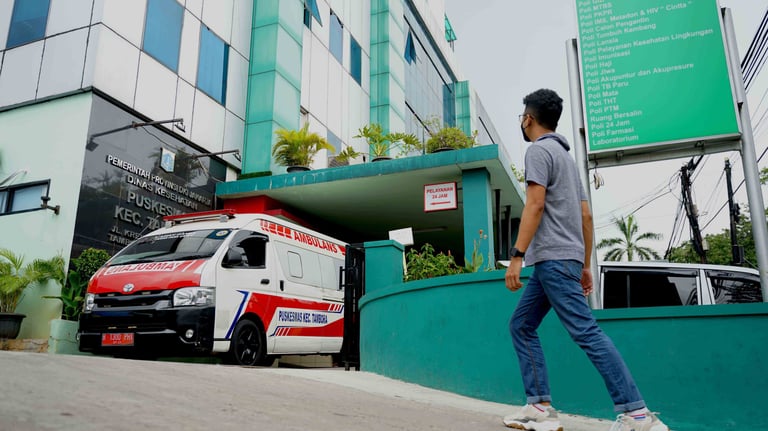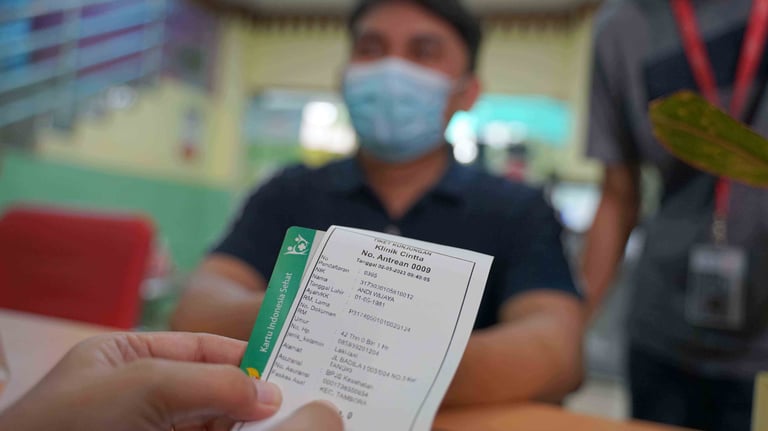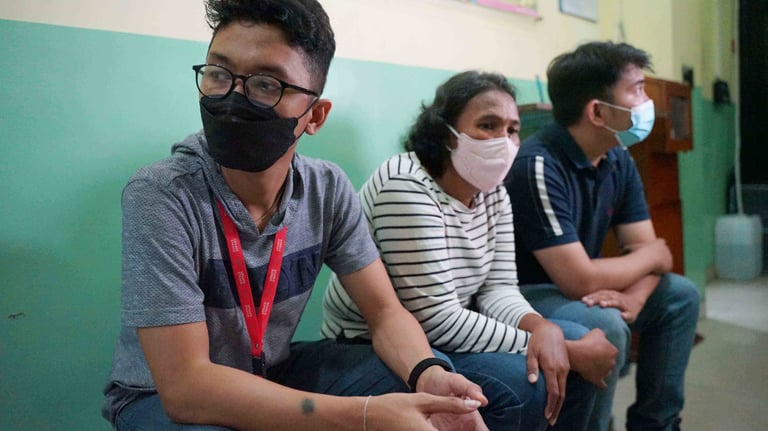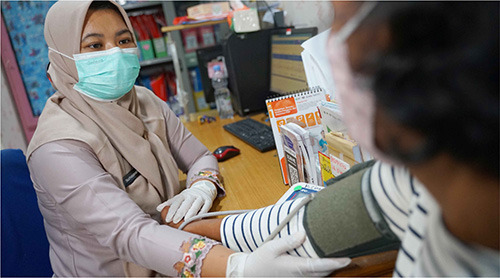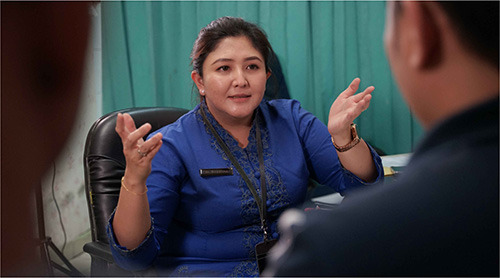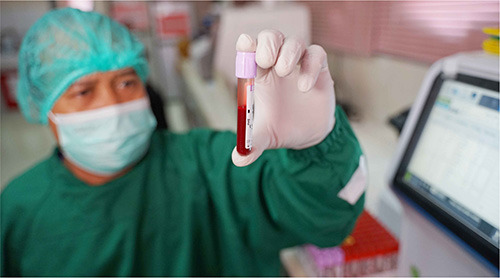HIV Services at Health Facilities
At the Tambora Health Center in West Jakarta, health service activities for people living with HIV (PLHIV) are carefully recorded and monitored. This helps to ensure that patients are receiving the appropriate care and treatment, and that their progress can be tracked over time. Recording the process of health service activities also helps healthcare providers to identify any areas where improvements can be made, and to develop more effective treatment plans for individual patients. By maintaining detailed records of the care provided to PLHIV, the Tambora Health Center is able to ensure that all patients receive the highest level of care possible, and that their health and wellbeing is always the top priority.
All of the theme shots presented here were showcased by models and went through a written approval process.
the Walk In
People living with HIV (PLHIV) commonly visit the Puskesmas, which is a healthcare facility in Indonesia, to receive medical services. The Puskesmas provides a range of health services, including testing, treatment, and counseling for HIV/AIDS. Patients can also receive antiretroviral therapy (ART) and other necessary medications to manage their condition. The Puskesmas staff are trained to provide confidential and non-judgmental care to PLHIV, and to promote healthy behaviors and lifestyles. The facility also provides education and outreach programs to help prevent the spread of HIV/AIDS within the community. Overall, the Puskesmas is an important resource for PLHIV in Indonesia, and plays a critical role in supporting the health and well-being of this population.
Registration
PLHIV, or people living with HIV, can register to receive important health services. This registration process helps to ensure that individuals with HIV can access the care and support they need to manage their condition effectively. By registering, PLHIV can receive medical treatment, counseling, and other forms of support that can help them to lead healthier and more fulfilling lives. The registration process typically involves providing personal information, such as name and contact details, as well as medical information related to the diagnosis and treatment of HIV. Overall, registering for health services is an important step for PLHIV to take in order to maintain their health and well-being, and to access the care and support that they need to manage their condition effectively.
Waiting Room
PLHIV (People Living with HIV) are waiting patiently for their turn to receive essential health services. Despite the challenges they face, including stigma and discrimination, they remain committed to maintaining their health and well-being. As they wait, they may engage in conversation with each other, offering support and advice, or simply pass the time quietly. The waiting room may be filled with a range of emotions, from hope and determination to anxiety and fear. However, the staff are dedicated to providing high-quality care with compassion and understanding, ensuring that every patient feels welcome and valued. PLHIV are an important and resilient community, and their efforts to access healthcare services are a testament to their strength and courage.
Medical Exam
PLHIV, or People Living with HIV, receive a comprehensive health examination to monitor the progression of the virus and assess the overall well-being of the patient. This examination may include laboratory tests to check the viral load and CD4 count, as well as screenings for other health conditions that may be more common in people with HIV. The exam may also include a physical examination and discussions about any symptoms or concerns the patient may have. Regular health examinations are important for PLHIV to ensure that they are receiving appropriate medical care and to detect and treat any health issues early on. By staying on top of their health, PLHIV can maintain a good quality of life and improve their chances of living long and healthy lives.
Counseling
Health workers play a crucial role in supporting people living with HIV (PLHIV) by offering health guidance and counseling. These professionals work closely with PLHIV to provide information on treatment regimens, medication adherence and lifestyle choices that can help manage the virus effectively. Health workers also offer emotional support to help patients cope with the psychological impact of their diagnosis. By providing education and counseling, health workers can help PLHIV make informed decisions about their health, and improve their quality of life. Health workers are trained to handle the complex medical and emotional needs of PLHIV, and are an essential part of the healthcare team working to address the HIV epidemic.
Laboratory
Blood tests are frequently conducted in laboratories to determine the HIV status of people living with HIV (PLHIV). This is an important diagnostic process that is carried out regularly to check the virus's progression and ensure that the appropriate medications are administered. These tests are typically performed by drawing blood from the patient and checking it for the presence of HIV antibodies. If the test is positive for HIV antibodies, additional testing will be required to confirm the diagnosis. Additionally, blood tests are regularly conducted to monitor the patient's viral load, CD4 count, and other important health indicators. This allows healthcare providers to develop an effective treatment plan that meets the patient's specific needs and improves their overall health and well-being.
Farmacy
Medications are a very important part of managing HIV infection in people living with HIV (PLHIV). These medicines, also known as antiretroviral therapy (ART), help to keep the virus under control and prevent it from damaging the immune system. The goal of ART is to reduce the amount of HIV in the body to undetectable levels, which can significantly improve the health and wellbeing of PLHIV. ART is usually taken daily and requires strict adherence to ensure its effectiveness. Maintaining an undetectable viral load not only benefits the individual's health but also reduces the risk of transmitting HIV to others. Therefore, it is crucial that PLHIV are committed to taking their medication and working closely with their healthcare provider to manage their HIV status.

